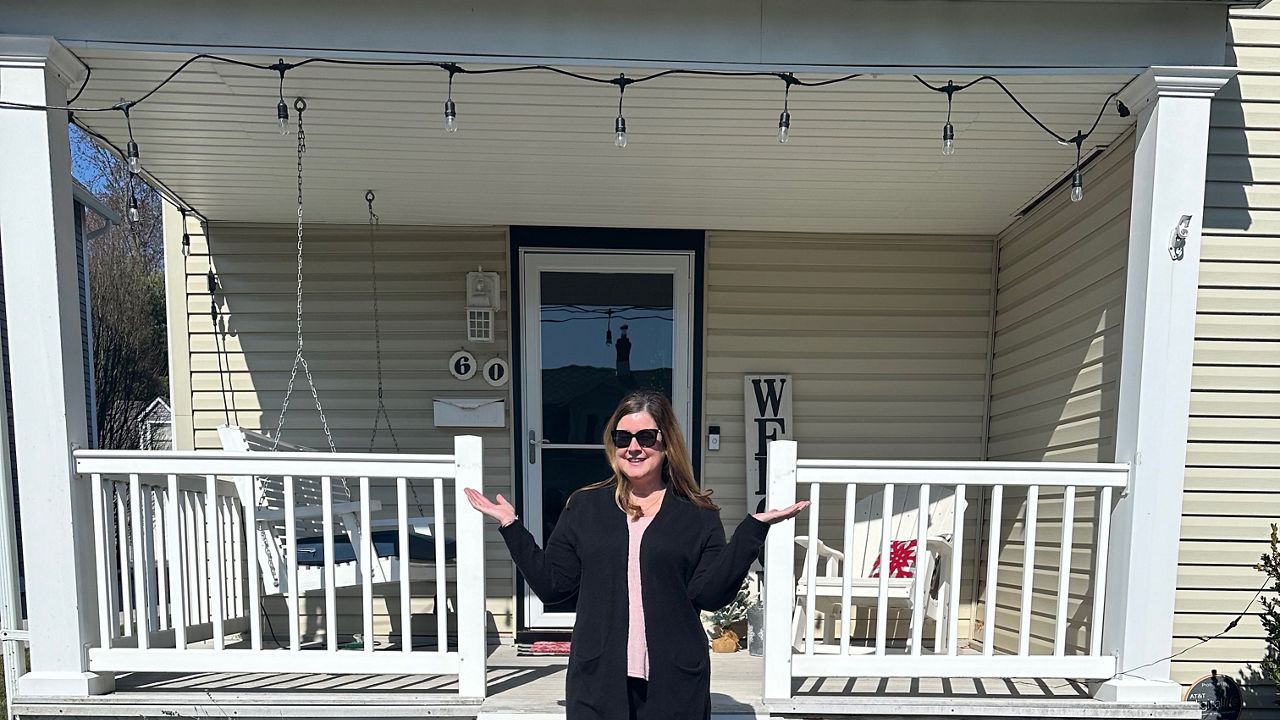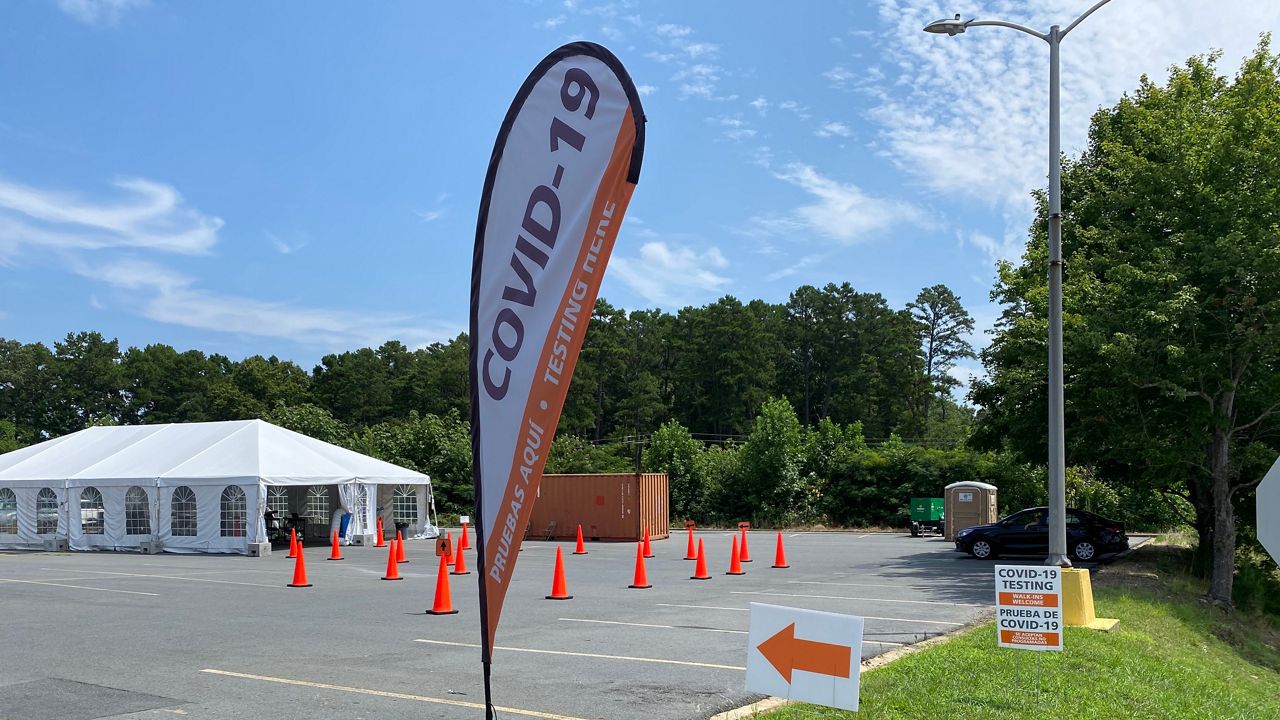ALBEMARLE, N.C. — Public health workers in Stanly County are doing everything they can to try to get more people vaccinated. They’re handing out $25 cash cards, hosting vaccine events at churches and working with community paramedics to get vaccines out to homebound people.
The county health department is giving vaccine shots in downtown Albemarle, in the center of the county. But foot traffic outside the health department was slow this week, and a big tent sent up in the parking lot for coronavirus testing was quiet except for the hum of equipment.
“Stanly County is at 35% for the first dose and 32% for fully vaccinated, which is much lower than where we need to be percentage-wise. The health department is still vaccinating people Monday, Tuesday and Wednesday although at a much lower rate than previously,” county public health director David Jenkins said.
Statewide, about half of the population has had at least one shot and 47% is fully vaccinated, according to data from the North Carolina Department of Health and Human Services.
Stanly County, a largely rural area to the east of Charlotte, is in the same situation as about a dozen other counties in North Carolina, struggling to get residents vaccinated, according to data from DHHS and the Centers for Disease Control and Prevention.
“My professional opinion is there are various reasons individuals choose not to get vaccinated. Some examples include religion, political affiliation, misinformation/disinformation, distrust of the government, optimism bias (it won't happen to me), and just plain old stubbornness,” Jenkins said in an email to Spectrum News 1.
“Our public health goal is to save lives and protect our community where we live, work, and play, and we believe that vaccines are how this will be accomplished,” he said.
RELATED: State workers will have to be vaccinated or wear masks, get tested weekly, N.C. governor says
Last week, the Albemarle Fire Department announced an outbreak among firefighters there and had to call in help from other departments in nearby Kannapolis and Concord.
"At the peak, we had 10 firefighters impacted with COVID. One individual has been cleared to return to work. We potentially have several more being cleared in the next few days. While this is good news, there are still difficult challenges," the department said on social media. The fire department did not say how many firefighters were vaccinated.
Doctors and public health officials are facing pushback from many in communities around the state, even as the new delta variant pushes case numbers back up.
On Thursday, the state reported more than 3,200 new cases for the first time since February. The number of people in the hospital is climbing again too, with DHHS reporting 1,141 people hospitalized with COVID-19.
Almost all of the new cases, 94%, are in people who are not fully vaccinated, according to DHHS.
"People who are unvaccinated make up most all of our cases where people are getting sick and hospitalized. The delta variant of COVID is even more contagious to those who are not vaccinated. It doesn’t matter your age or race. If you are not vaccinated, you are at great risk," Gov. Roy Cooper said during a news conference Thursday afternoon.
North Carolina’s statewide mask mandate is set to expire this week.
"We want to do things like masks and being careful, but the vaccine is the way through," the governor said.
RELATED: Debate over masks in schools divides North Carolina
He said vaccinated people should talk to their relatives and friends who have not gotten the shots yet, and doctors should reach out to patients to convince them to get vaccinated.
"Battling misinformation comes from trusted people and from doctors," Cooper said.
Earlier in the day, the governor visited a vaccination site at a McDonald’s in Nashville, about 45 miles east of Raleigh.
"Such private/public partnerships add support to the need for our unvaccinated citizens to become protected by simply rolling up their sleeves and being vaccinated while also dining out at McDonalds,” said Nash County health director Bill Hill.

Nash County’s vaccination rate is better than some others in eastern North Carolina. About 47% of Nash County’s population has gotten at least one shot, according to DHHS. Forty-four percent are fully vaccinated.
But that’s still far short of the 70% goal federal officials are shooting for.
Orange County, home of the University of North Carolina, has the highest vaccination rate in the state, with 67% of the population with at least one shot and 64% fully vaccinated.
Dare County, which includes much of the Outer Banks, comes in a close second with 61% fully vaccinated and 64% with at least one shot.
Wake is the only other county to break 60%. About 61% of Wake County has had at least one dose and 58% are fully vaccinated.
As vaccination rates lag across the country, the CDC this week changed its guidance and said even vaccinated people should wear masks indoors.
“The U.S. is now experiencing a fourth wave of COVID-19, driven by the delta variant, which is estimated to be twice as transmissible as the original strain,” said Dr. Gavin Yamey with the Duke Global Health Institute. “Communities with low rates of vaccination are seeing major surges in cases and, in these places, wearing masks in indoor public spaces can help to prevent spread of the virus.”
“The right public health response to control these surges is to use a range of science-based approaches — community-wide indoor mask mandates, social distancing rules, scaling up test and trace, and intensifying workplace and school mitigations (including improved ventilation) — until vaccination rates increase,” he said.
As cases spike again and vaccination rates continue to lag, DHHS Secretary Dr. Mandy Cohen said the state can tell where this next spike will be the worst: in areas with low vaccination rates in the Sandhills region and in areas outside of Charlotte like Stanly County.
She said the state is moving resources to prepare for more cases and more people in the hospital in those areas.
"This virus doesn’t care about county lines. But it does care about vaccination," Cohen said. "This is a pandemic now of the unvaccinated."
